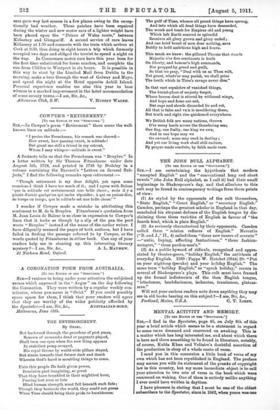THE JOHN BULL ALPHABET.
[To THE EDITOR OF THE "SPECTATOR.") Szn,—I am entertaining the hypothesis that modern "accepted English " and the " conventional long and short vowels" (the John Bull alphabet, as I call it) bad their small beginnings in Shakespeare's day, and that allusions to this cult may be found in contemporary writings from three points of view :
(1) As styled by the opponents of the cult themselves, "State English," "Court English," or "secretary English." Camden, perhaps the greatest scholar in England in that day, concluded his eloquent defence of the English tongue by dis• claiming these three varieties of English in favour of "the fourth kind, which is plain English."
(2) As seriously characterized by their opponents. Camden called them " minion refiners of English." Mercutio ("R. and J.," II., 4) called them " these new tuners of accents " —"antic, lisping, affecting fantasticoes," "these fashion- mongers," " these pardon-mee's."
(3) As a public byword of ridicule, recognized and appre- ciated by theatre-goers, "holiday English," the antithesis of everyday English. 1589 : Pappe W. Hatchet (1844) 20: "Put on your nightcap (peruke) and your holiday English." The same term "holiday English," or "speak holiday," occurs in several of Shakespeare's plays. This cult must have framed up the formal indictments of the then English tongue, "ictacismus, lambdacismus, ischnotes, tranlismus, plateas- mus."
Will not your curious readers note down anything they may see in old books bearing on this subject P-1 am, Sir, &c.,






































 Previous page
Previous page